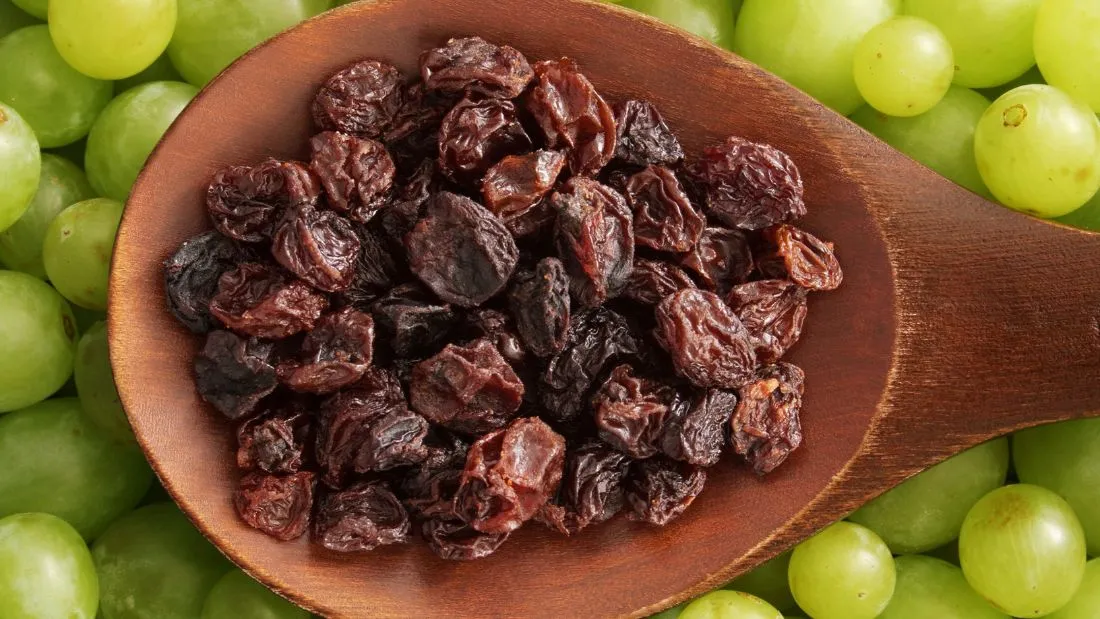Grapes and raisins

These sweet favourites have unexpected health benefits
The grape family
Grapes are native to the Northern Hemisphere – some species come from the Mediterranean, some from Asia and many from North America. Dozens of species have been cultivated for food and wine-making for millennia.
The grapes you eat fresh are known as table grapes, have a thin skin and may or may not have small seeds. The grapes used to make wine are smaller, have thicker skins and larger seeds. Raisins, sultanas and currants are all simply dried grapes of various colours and sizes.
Grape superpowers
There’s a huge variety of table grapes and while their appearance may vary, their nutritional qualities are similar. The only exception is antioxidants where the old rule applies – the darker the grape colour, the more antioxidants it has. These health-boosting compounds are concentrated mainly in the skin so while eating grapes supplies plentiful amounts, drinking grape juice does not.
All grape varieties contain antioxidants called polyphenols, which include a wide variety of natural compounds that strengthen your defences against disease, wear-and-tear damage and environmental pollution.
Some antioxidants give grapes their vibrant colours and these are called anthocyanins – black and purple grapes have the most, followed by red grapes. Anthocyanins have antidiabetic, anticancer, anti-inflammatory and antimicrobial effects, and they help to lower your risk of heart disease.
Green grapes have mainly flavanols, which are antioxidants with anti-inflammatory, antibacterial and antiviral properties and may also help to reduce your risk of cancer.
You may have heard of the antioxidant resveratrol. It is a type of polyphenol found in grape skins of all colours and is produced by a number of other plants to fight off bacteria and fungi. The amount in grapes depends much more on growing conditions than on the particular colour of grape. People tend to associate resveratrol with red wine and it’s true that it’s a rich source but only because red wine is made by fermenting grapes with skins, while white wine is made from the grape pulp only – the skins are removed before fermenting.
Nevertheless, all table grapes contain this powerful antioxidant, which may help to support your immune system, reduce your risk of certain cancers and lower your chances of developing heart disease.
Grape nutrients
A cup (150 grams) of grapes of any colour supplies around 100 calories and is a healthy, virtually fat-free snack. It contains 23 grams of natural sugars and 120 grams of water and so provides a great energy and hydration boost.
When it comes to vitamins and minerals, grapes are a great source of vitamin K – essential for healthy blood clotting and bone maintenance. One cup provides 22 micrograms which is almost a third of the recommended daily intake. Grapes also supply moderate amounts of vitamin C and a range of minerals but are not a particularly rich source.
Raisin rainbow
Raisins come in a wide range of sizes and colours depending on the type of grape and include yellow, green, brown, purple and black varieties. Most raisins are traditionally sun-dried for around three weeks and because grapes darken as they dry, raisins are typically dark brown. However, they may also be artificially dehydrated.
Sultanas, also called golden raisins because of their fair colour, are made from green, seedless grapes and usually dried in dehydrators with controlled temperature and humidity. They are typically coated with an oil-based solution prior to drying to speed up the process which allows them to retain a lighter colour and more moisture. They are also often treated with sulphur dioxide to help them retain their golden hue.
To add a little confusion, you can also find sultanas that are brown but still lighter than most raisins. They are made from the same grapes as golden sultanas but are dried naturally and don’t have sulphur dioxide added.
Currants are tiny dried black grapes and are sometimes called Zante currants because of their Greek origin. They are dried naturally for about three weeks.
Raisin nutrition
As raisins are dried grapes, you may expect a similar nutrient bundle to grapes yet raisins are quite different. Much of the vitamin content is lost during the drying process but, on the other hand, minerals are more concentrated. However, when looking at raisins’ nutritional values it’s important to consider the amount of raisins you would typically eat, which may be around two tablespoons. Some sources claim that raisins are a rich source of iron and calcium and it’s certainly true when you see how much of these minerals 100 grams of raisins contain – but two tablespoons provide only small to moderate amounts.
Aside from iron, which is essential for blood formation, and calcium, which is vital for healthy bones and muscle contraction, raisins also contain potassium, a mineral needed for nerve signal transmission, heart muscle contractions, blood pressure maintenance and for kidney health.
Raisins are an excellent natural sweetener as they are rich in sugar but also fibre, which makes them good for your digestive system and slows down the sugar absorption. It means they are excellent as healthy, energy-giving snacks or as ingredient in breakfasts, biscuits and sweet bakes.
Where raisins truly shine, however, is their antioxidant content – they are an exceptional source and research shows they help protect your heart health and can reduce your risk of cancer. They may be low in other nutrients but they are a true antioxidant powerhouse!
Which is healthier?
Grapes and raisins are both a healthy addition to your diet and it’s impossible to say that one is better than the other. It’s best to find a balance – have some fresh grapes as a snack and add raisins to your menu for a burst of healthy sweetness.




